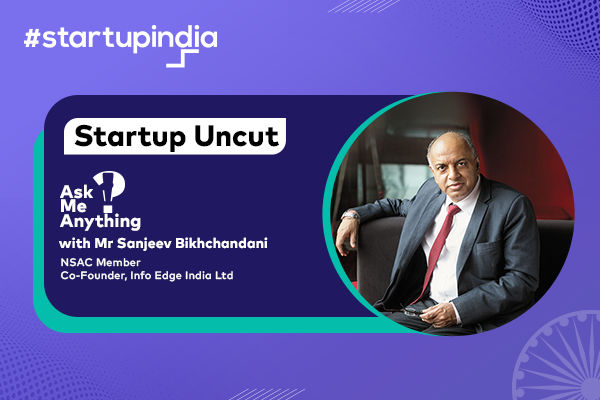India’s startup ecosystem, with over 1.74 lakh DPIIT-recognized startups as of April 2025, is a global force driving innovation and economic growth. Sanjeev Bikhchandani, Co-Founder of Info Edge India Ltd. and a member of the National Startup Advisory Council, exemplifies this transformation. In a Startup India “Startup Uncut” interview with Shaurya Bhaglal, Bikhchandani shared insights from Info Edge’s journey, offering actionable advice on product-market fit, customer acquisition, funding, team building, and scaling. This article summarizes his key lessons, enriched with data and examples, to guide entrepreneurs in navigating startup challenges.
Info Edge’s Journey: From Drift to Dominance
Founded in 1990, Info Edge initially drifted, experimenting with small ventures like salary surveys and trademark databases. The pivotal shift came in 1997 with the launch of Naukri.com, India’s leading job portal, transforming Info Edge into an internet company. By 2025, Info Edge operates platforms like 99acres.com, Jeevansathi.com, and Shiksha.com, employs over 4,000 people, and has a market capitalization exceeding $10 billion. It has invested in unicorns like Zomato and Policybazaar, with cumulative investments of ₹570 crore yielding ₹5,300 crore in returns by 2018.
Key Milestones
- 1990–1997: Drifted with small ventures, including salary surveys for MBA/engineering freshers and digitized trademark databases, addressing customer pain points.
- 1997: Launched Naukri.com, aggregating job listings when internet penetration was under 1 million in India.
- 2000: Raised venture capital, enabling professional hires like a CFO, critical for scaling.
- 2006: Became the first Indian internet company to list on BSE/NSE, overcoming dotcom bust challenges.
- 2010–2019: Invested in startups like Zomato (₹327 crore, now worth ₹2,030 crore) and Policybazaar (₹64 crore, now worth ₹511 crore).
- 2020: Received Padma Shri for contributions to entrepreneurship.
Bikhchandani attributes success to customer focus, cost efficiency, and persistence, navigating early challenges like limited funds and infrastructure through innovative cost-cutting.
Core Lessons for Startups
1. Deep Customer Insights Drive Product-Market Fit
Bikhchandani emphasizes that successful businesses stem from solving real customer problems. For example, Naukri.com addressed the need for centralized job listings, inspired by his IIM Ahmedabad observations of campus hiring. Similarly, digitized trademark surveys solved slow, manual processes for lawyers. “Businesses don’t need to hard-sell when they address unsolved problems,” he notes.
Action: Conduct 50–100 customer interviews to identify pain points, validate solutions, and achieve product-market fit within 6 months.
2. Build a Trust-Based Team
A great team, built on trust, is critical for scaling. Bikhchandani stresses honesty and sincerity in relationships with co-founders, investors, and customers. Early on, Info Edge offered equity or revenue-sharing to attract IIT/IIM talent due to limited funds, fostering loyalty.
Action: Hire key roles (e.g., CTO, CFO) early, offering 1–3% equity if cash is constrained, and foster trust through transparent communication.
3. Customer Acquisition Through Feet-on-Street
Unlike typical internet startups relying on remote sales, Info Edge’s field salesforce was a competitive moat. In-person pitches upsold clients from ₹50,000 to ₹50 lakh deals, reducing acquisition costs by 20–30%.
Action: Deploy a lean sales team to target high-value clients, training them to upsell and gather feedback within 90 days of launch.
4. Find a Repeatable Profitable Unit
Bikhchandani discovered scalability through a “repeatable profitable unit.” An experiment showed each salesperson generated ₹50,000/month in sales at a ₹22,000 cost, enabling profitable scaling. This model helped Info Edge break even during the dotcom bust.
Action: Test revenue models to identify a unit economics structure (e.g., ₹2 revenue per ₹1 cost) within 6–12 months of MVP launch.
5. Conserve Cash and Focus on Fundamentals
During crises like COVID-19, Info Edge’s ₹2,300 crore cash reserves (after accounting for ₹1,100 crore in customer advances) ensured a 3-year runway without layoffs, unlike competitors. Bikhchandani advises conserving cash, focusing on revenue, and maintaining real margins.
Action: Stress-test your balance sheet to ensure a 12–18-month runway and cut non-essential costs (e.g., marketing) during downturns.
6. Innovate to Stay Ahead
Starting early gave Info Edge a first-mover advantage, but competition from LinkedIn required continuous innovation. Customer feedback drove iterative improvements, maintaining market leadership.
Action: Implement a build-test-learn cycle, releasing one feature update every 2–3 weeks based on customer insights.
7. Leverage DPIIT and Startup India
Bikhchandani praises Startup India’s Fund of Funds and ecosystem support, which facilitated ₹600 crore in funding and ₹1,200 crore in GeM orders for startups in 2024. DPIIT recognition offers tax exemptions, IP rebates, and market access.
Action: Apply for DPIIT recognition within 60 days of incorporation to access Seed Fund Scheme grants and fast-tracked patents.
Overcoming Entrepreneurship Challenges
- Funding Winter: Bikhchandani notes that crises (e.g., 2008, COVID-19) are ideal for investing in cost-efficient startups with strong fundamentals. Info Edge’s investments in Zomato and Policybazaar during the 2008 crisis yielded 10x returns.
- Market Entry: Early entry ensures a “number one” position, even with imperfections. Info Edge’s low-cost structure turned limited funds into profits.
- Going Public: Listing requires robust governance and a scalable model. Info Edge’s IPO success in 2006 and Zomato’s ₹9,375 crore IPO in 2021 highlight the need for adaptability.
- Scaling Barriers: Avoid over-dilution (e.g., <20% founder equity) to retain motivation post-IPO. Offer ESOPs (1–4%) to align team incentives.
Conclusion
Sanjeev Bikhchandani’s journey with Info Edge underscores the power of customer focus, trust-based teams, and persistent innovation. From a servant quarter startup to a $10 billion enterprise, Info Edge’s success offers a blueprint for entrepreneurs: solve real problems, build scalable models, and leverage India’s startup ecosystem. Apply for DPIIT recognition within 60 days, validate product-market fit with 50+ customer interviews, and test unit economics within 6 months. Watch the full “Startup Uncut” session at YouTube and follow Startup India’s social media for upcoming Ask-Me-Anything sessions to gain further insights.
Disclaimer: This article is for educational purposes and does not constitute financial or legal advice. Consult certified advisors and verify details with DPIIT or Startup India.

